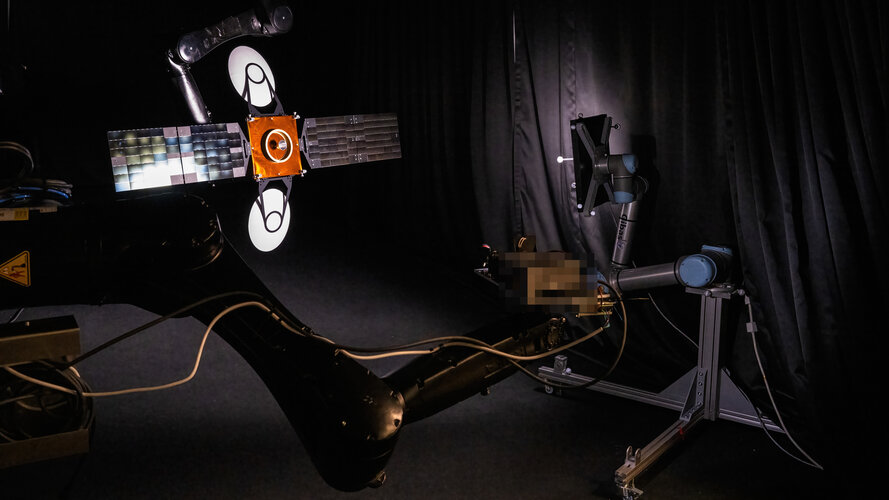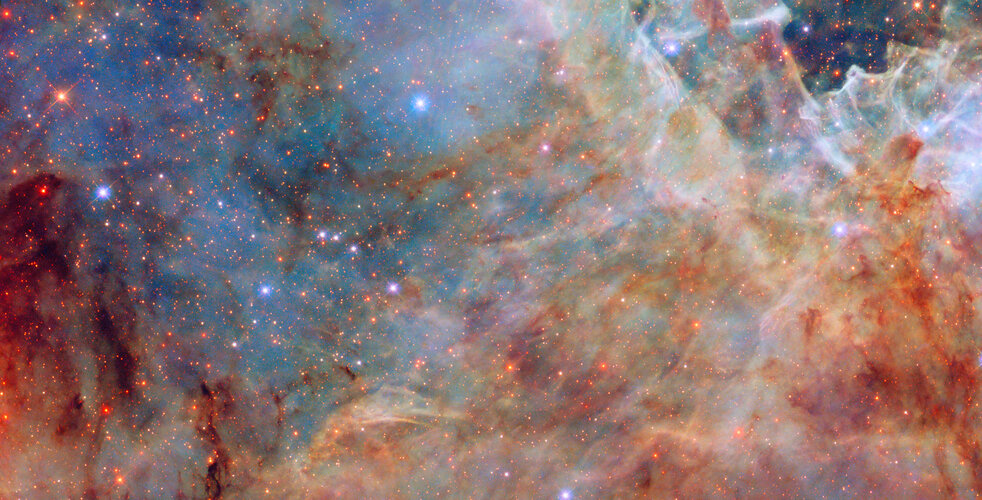
Copernical Team
Friday, 24 January 2025 12:25
Satellite ready for close-up
 Image:
Satellite ready for close-up
Image:
Satellite ready for close-up
Published in
News
Tagged under
Friday, 24 January 2025 12:56
Week in images: 20-24 January 2025

Week in images: 20-24 January 2025
Discover our week through the lens
Published in
News
Tagged under
Friday, 24 January 2025 14:00
The sounds of BepiColombo's sixth flight past Mercury
 Video:
00:01:20
Video:
00:01:20
Listen to the ESA/JAXA BepiColombo spacecraft as it flew past Mercury on 8 January 2025. This sixth and final flyby used the little planet's gravity to steer the spacecraft on course for entering orbit around Mercury in 2026.
What you can hear in the sonification soundtrack of this video are real spacecraft vibrations measured by the Italian Spring Accelerometer (ISA) instrument. The accelerometer data have been shifted in frequency to make them audible to human ears – one hour of measurements have been sped up to one minute of sound.
BepiColombo is always shaking ever so
Published in
News
Tagged under
Thursday, 23 January 2025 09:11
Bright Ascension software powers Czech Republic's largest satellite mission
Los Angeles CA (SPX) Jan 21, 2025
 Bright Ascension Ltd., a leading provider of space software technology, has announced the successful deployment of its software aboard the Czech Republic's largest satellite, TROLL. The satellite was launched on January 14, 2025, as part of the SpaceX Transporter 12 mission. This achievement underscores both the Czech Republic's growing prominence in space exploration and Bright Ascension's expe
Bright Ascension Ltd., a leading provider of space software technology, has announced the successful deployment of its software aboard the Czech Republic's largest satellite, TROLL. The satellite was launched on January 14, 2025, as part of the SpaceX Transporter 12 mission. This achievement underscores both the Czech Republic's growing prominence in space exploration and Bright Ascension's expe
 Bright Ascension Ltd., a leading provider of space software technology, has announced the successful deployment of its software aboard the Czech Republic's largest satellite, TROLL. The satellite was launched on January 14, 2025, as part of the SpaceX Transporter 12 mission. This achievement underscores both the Czech Republic's growing prominence in space exploration and Bright Ascension's expe
Bright Ascension Ltd., a leading provider of space software technology, has announced the successful deployment of its software aboard the Czech Republic's largest satellite, TROLL. The satellite was launched on January 14, 2025, as part of the SpaceX Transporter 12 mission. This achievement underscores both the Czech Republic's growing prominence in space exploration and Bright Ascension's expe
Published in
News
Tagged under
Thursday, 23 January 2025 09:11
Gilat Secures Over 5 Million in Contracts for Defense Connectivity
Paris, France (SPX) Jan 22, 2025
 Gilat Satellite Networks Ltd. (NASDAQ, TASE: GILT), a global leader in satellite networking technology and solutions, has announced that its US-based subsidiary, Gilat DataPath, has secured contracts exceeding $5 million. These agreements, awarded by the US Department of Defense (DoD) and other international Defense Forces, involve providing DKET terminals and Field Service Representative (FSR)
Gilat Satellite Networks Ltd. (NASDAQ, TASE: GILT), a global leader in satellite networking technology and solutions, has announced that its US-based subsidiary, Gilat DataPath, has secured contracts exceeding $5 million. These agreements, awarded by the US Department of Defense (DoD) and other international Defense Forces, involve providing DKET terminals and Field Service Representative (FSR)
 Gilat Satellite Networks Ltd. (NASDAQ, TASE: GILT), a global leader in satellite networking technology and solutions, has announced that its US-based subsidiary, Gilat DataPath, has secured contracts exceeding $5 million. These agreements, awarded by the US Department of Defense (DoD) and other international Defense Forces, involve providing DKET terminals and Field Service Representative (FSR)
Gilat Satellite Networks Ltd. (NASDAQ, TASE: GILT), a global leader in satellite networking technology and solutions, has announced that its US-based subsidiary, Gilat DataPath, has secured contracts exceeding $5 million. These agreements, awarded by the US Department of Defense (DoD) and other international Defense Forces, involve providing DKET terminals and Field Service Representative (FSR)
Published in
News
Tagged under
Thursday, 23 January 2025 09:11
Surrey Satellite Opens Advanced Imaging R&D Cleanroom
London, UK (SPX) Jan 22, 2025
 Surrey Satellite Technology Ltd (SSTL) has officially opened its advanced Research and Development Imaging Cleanroom at its Guildford headquarters. This new facility is designed to strengthen the company's expertise in optical imaging-a key technology for its Earth observation satellite missions.
The cleanroom, now fully operational, houses SSTL's Optical Payloads Team and was developed wi
Surrey Satellite Technology Ltd (SSTL) has officially opened its advanced Research and Development Imaging Cleanroom at its Guildford headquarters. This new facility is designed to strengthen the company's expertise in optical imaging-a key technology for its Earth observation satellite missions.
The cleanroom, now fully operational, houses SSTL's Optical Payloads Team and was developed wi
 Surrey Satellite Technology Ltd (SSTL) has officially opened its advanced Research and Development Imaging Cleanroom at its Guildford headquarters. This new facility is designed to strengthen the company's expertise in optical imaging-a key technology for its Earth observation satellite missions.
The cleanroom, now fully operational, houses SSTL's Optical Payloads Team and was developed wi
Surrey Satellite Technology Ltd (SSTL) has officially opened its advanced Research and Development Imaging Cleanroom at its Guildford headquarters. This new facility is designed to strengthen the company's expertise in optical imaging-a key technology for its Earth observation satellite missions.
The cleanroom, now fully operational, houses SSTL's Optical Payloads Team and was developed wi
Published in
News
Tagged under
Thursday, 23 January 2025 09:11
NASA rockets to fly through flickering, vanishing auroras
Greenbelt MD (SPX) Jan 22, 2025
 Two NASA rocket missions are taking to the Alaskan skies in hopes of discovering why some auroras flicker, others pulsate, and still others are riddled with holes. Understanding these peculiar features is part of NASA's goal to understand the space environment around our planet, which can affect both spacecraft and astronauts. The launch window for the missions - which will fly out of the Poker
Two NASA rocket missions are taking to the Alaskan skies in hopes of discovering why some auroras flicker, others pulsate, and still others are riddled with holes. Understanding these peculiar features is part of NASA's goal to understand the space environment around our planet, which can affect both spacecraft and astronauts. The launch window for the missions - which will fly out of the Poker
 Two NASA rocket missions are taking to the Alaskan skies in hopes of discovering why some auroras flicker, others pulsate, and still others are riddled with holes. Understanding these peculiar features is part of NASA's goal to understand the space environment around our planet, which can affect both spacecraft and astronauts. The launch window for the missions - which will fly out of the Poker
Two NASA rocket missions are taking to the Alaskan skies in hopes of discovering why some auroras flicker, others pulsate, and still others are riddled with holes. Understanding these peculiar features is part of NASA's goal to understand the space environment around our planet, which can affect both spacecraft and astronauts. The launch window for the missions - which will fly out of the Poker
Published in
News
Tagged under
Thursday, 23 January 2025 09:11
Exploring ethical dimensions of aware AI in Uppsala
Paris, France (SPX) Jan 22, 2025
 Artificially intelligent systems are increasingly prevalent in our daily lives, from automated vehicles to delivery robots and virtual assistants. As research shifts towards developing systems with artificial awareness, critical ethical questions arise: What responsibilities come with these advancements? How can benefits and challenges be balanced among developers, policymakers, and end-users? A
Artificially intelligent systems are increasingly prevalent in our daily lives, from automated vehicles to delivery robots and virtual assistants. As research shifts towards developing systems with artificial awareness, critical ethical questions arise: What responsibilities come with these advancements? How can benefits and challenges be balanced among developers, policymakers, and end-users? A
 Artificially intelligent systems are increasingly prevalent in our daily lives, from automated vehicles to delivery robots and virtual assistants. As research shifts towards developing systems with artificial awareness, critical ethical questions arise: What responsibilities come with these advancements? How can benefits and challenges be balanced among developers, policymakers, and end-users? A
Artificially intelligent systems are increasingly prevalent in our daily lives, from automated vehicles to delivery robots and virtual assistants. As research shifts towards developing systems with artificial awareness, critical ethical questions arise: What responsibilities come with these advancements? How can benefits and challenges be balanced among developers, policymakers, and end-users? A
Published in
News
Tagged under
Thursday, 23 January 2025 09:11
NASA Opens New Challenge to Inspire Climate Solutions
Los Angeles CA (SPX) Jan 22, 2025
 NASA has launched the Sustainable Business Model Challenge to encourage entrepreneurs, startups, and researchers to use the agency's Earth system science data in developing innovative commercial solutions to address climate challenges. This initiative aims to connect vast NASA climate data resources with actionable business models to support climate resilience and informed decision-making.
NASA has launched the Sustainable Business Model Challenge to encourage entrepreneurs, startups, and researchers to use the agency's Earth system science data in developing innovative commercial solutions to address climate challenges. This initiative aims to connect vast NASA climate data resources with actionable business models to support climate resilience and informed decision-making.
 NASA has launched the Sustainable Business Model Challenge to encourage entrepreneurs, startups, and researchers to use the agency's Earth system science data in developing innovative commercial solutions to address climate challenges. This initiative aims to connect vast NASA climate data resources with actionable business models to support climate resilience and informed decision-making.
NASA has launched the Sustainable Business Model Challenge to encourage entrepreneurs, startups, and researchers to use the agency's Earth system science data in developing innovative commercial solutions to address climate challenges. This initiative aims to connect vast NASA climate data resources with actionable business models to support climate resilience and informed decision-making.
Published in
News
Tagged under
Thursday, 23 January 2025 09:11
Emory researchers explore heart cell growth in space to advance treatments on Earth
Los Angeles CA (SPX) Jan 22, 2025
 A research team led by Chunhui Xu from Emory University has demonstrated that heart muscle cells can survive and grow in the microgravity environment of space. Published in Biomaterials, the findings suggest new avenues for creating more resilient heart cells that could enhance cell therapy-a technique that involves transplanting millions of heart cells to repair damaged cardiac tissue.
"T
A research team led by Chunhui Xu from Emory University has demonstrated that heart muscle cells can survive and grow in the microgravity environment of space. Published in Biomaterials, the findings suggest new avenues for creating more resilient heart cells that could enhance cell therapy-a technique that involves transplanting millions of heart cells to repair damaged cardiac tissue.
"T
 A research team led by Chunhui Xu from Emory University has demonstrated that heart muscle cells can survive and grow in the microgravity environment of space. Published in Biomaterials, the findings suggest new avenues for creating more resilient heart cells that could enhance cell therapy-a technique that involves transplanting millions of heart cells to repair damaged cardiac tissue.
"T
A research team led by Chunhui Xu from Emory University has demonstrated that heart muscle cells can survive and grow in the microgravity environment of space. Published in Biomaterials, the findings suggest new avenues for creating more resilient heart cells that could enhance cell therapy-a technique that involves transplanting millions of heart cells to repair damaged cardiac tissue.
"T
Published in
News
Tagged under

